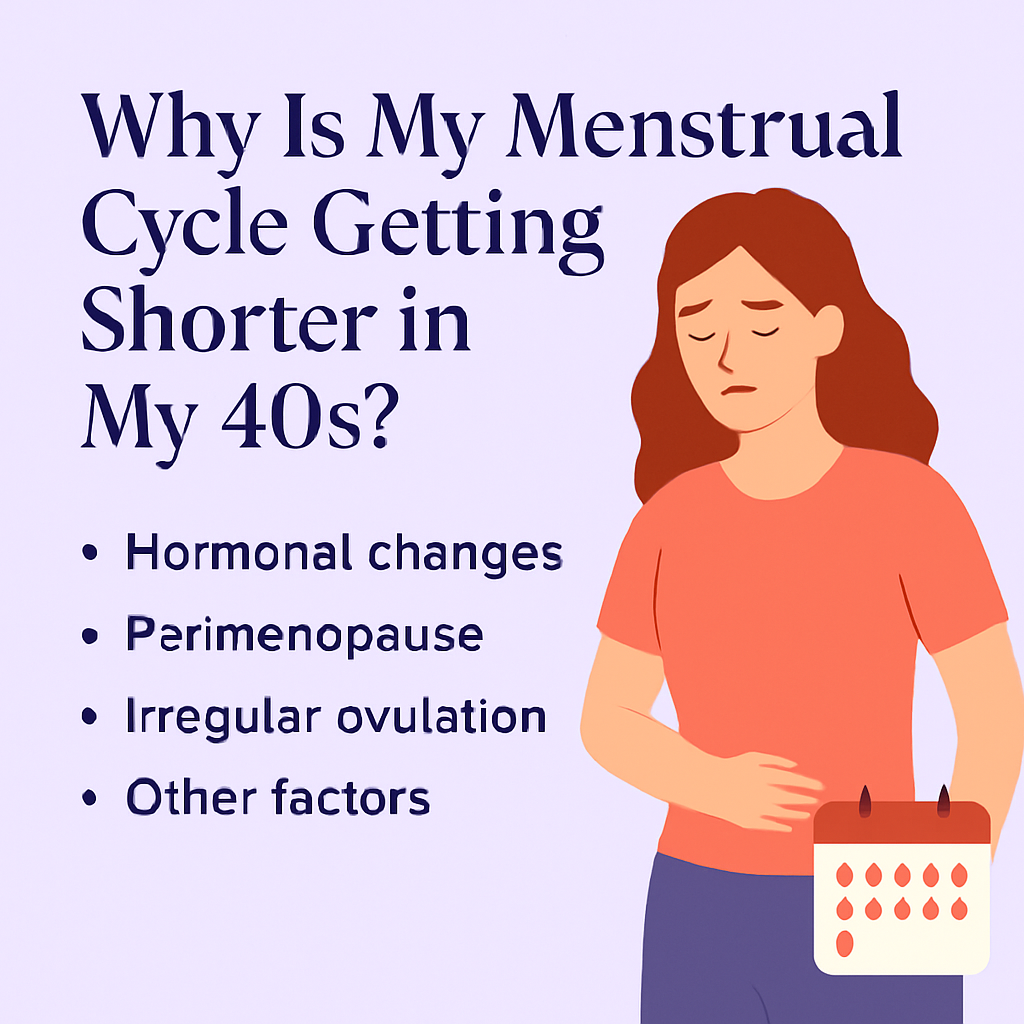Irregular Periods Over 40 — Causes, Symptoms & When to See a Doctor

Irregular Periods Over 40
If you’re noticing irregular periods over 40, you’re not alone — and most of the time, it’s part of a natural life stage. As women move through their 40s, the body begins the gradual transition towards menopause. This phase, called perimenopause, is one of the most common reasons for changes in your menstrual cycle.
While irregular bleeding is usually normal at this stage, it’s important to understand when it may signal something more serious. This guide explains what counts as an irregular period, the link with perimenopause, possible causes, and when you should see a doctor.
What Is an Irregular Period?
Your menstrual cycle runs from the first day of one period to the first day of the next. On average, it lasts 28 days, but a cycle between 21 and 35 days is also considered normal.
- A period is classed as irregular if:
- Your cycle length changes significantly from month to month
- Periods come sooner than every 21 days
- Periods come less often than every 35 days
If you are over 40, irregular periods are often a sign your body is moving into perimenopause.

Irregular Periods Over 40 and Perimenopause
Perimenopause is the transition between your reproductive years and menopause (no period for 12 months). It can last 1–10 years, typically starting in your mid-40s, but sometimes earlier or later.
Common perimenopause symptoms alongside irregular periods include:
-
Hot flushes
-
Night sweats
-
Difficulty sleeping
-
Low mood or anxiety
-
Reduced libido
-
Vaginal dryness or discomfort during sex
-
Problems with memory or concentration
Because these symptoms can start before your periods become irregular, many women don’t realise they’ve entered perimenopause until their cycle changes.
Why Do Periods Become Irregular Over 40?
Hormonal changes are the main reason. As the ovaries age, they produce less oestrogen and fewer follicles, and respond less to luteinizing hormone (LH) and follicle-stimulating hormone (FSH). This fluctuation can cause:
-
Shorter or longer cycles
-
Skipped periods
-
Heavier or lighter bleeding
-
Intermenstrual bleeding (spotting between periods)
Intermenstrual Bleeding — Not the Same as Irregular Periods
Intermenstrual bleeding happens outside your usual cycle and may occur before or after a period. While it can be a normal part of perimenopause, it’s always worth checking with a doctor to rule out other causes. Tests might include:
-
Cervical smear (to check for cervical cancer)
-
Pelvic ultrasound (to check for fibroids, polyps, or uterine cancer — rare)
When to See a Doctor About Irregular Periods Over 40
See your GP promptly if you experience:
-
Very heavy bleeding or passing blood clots
-
Periods lasting much longer than normal
-
Spotting between periods
-
Spotting after sex
-
Minimal gap between periods
While perimenopause is the most common reason, other possible causes include fibroids, polyps, hormonal imbalances, pregnancy, blood clotting disorders, diabetes, sexually transmitted infections (STIs), or, less commonly, cancer.
Lifestyle Factors That Affect Your Period
Irregular periods over 40 aren’t always due to hormones. Lifestyle factors can also play a role:
-
Significant weight gain or loss
-
Over-exercising
-
Poor diet
-
Smoking
-
High stress levels
-
Hormonal contraception
Key Takeaway
Most of the time, irregular periods over 40 are a normal part of perimenopause. However, it’s important to be aware of symptoms that may indicate other health conditions. Speak to your doctor if you notice anything unusual or concerning — early checks can give you peace of mind and help you manage this stage of life with confidence.
Irregular Periods Over 40 — FAQ
1. Are irregular periods after 40 normal?
Yes. In most cases, irregular periods over 40 are a normal part of the transition into menopause, known as perimenopause. Hormone fluctuations can cause changes in cycle length, flow, and symptoms.
2. What are the first signs of perimenopause?
The most common early sign is a change in your menstrual cycle — periods may become shorter, longer, lighter, or heavier. Other early signs include hot flushes, night sweats, mood changes, sleep difficulties, and changes in libido.
3. Can stress cause irregular periods over 40?
Yes. High stress levels can affect hormone balance and disrupt your menstrual cycle, making periods irregular. Stress can also worsen other perimenopause symptoms like poor sleep and low mood.
4. When should I see a doctor for irregular periods?
See your GP promptly if you experience:
-
Very heavy bleeding or large blood clots
-
Periods that last much longer than usual
-
Bleeding between periods or after sex
-
Very short cycles with almost no break between periods
5. Can lifestyle changes help regulate periods during perimenopause?
They can help. Maintaining a balanced diet, exercising regularly (but not excessively), reducing stress, quitting smoking, and maintaining a healthy weight can all support hormonal balance and help reduce irregular bleeding.
6. Could irregular periods over 40 mean something more serious?
Yes, although it’s less common. Conditions such as fibroids, polyps, hormonal disorders, diabetes, thyroid issues, and — rarely — cancers can cause abnormal bleeding. That’s why it’s important to get checked if symptoms are unusual or persistent.
7. How long will irregular periods last before menopause?
The perimenopause phase can last from 1 to 10 years, with irregular cycles often appearing in the last few years before menopause. Every woman’s experience is different.
